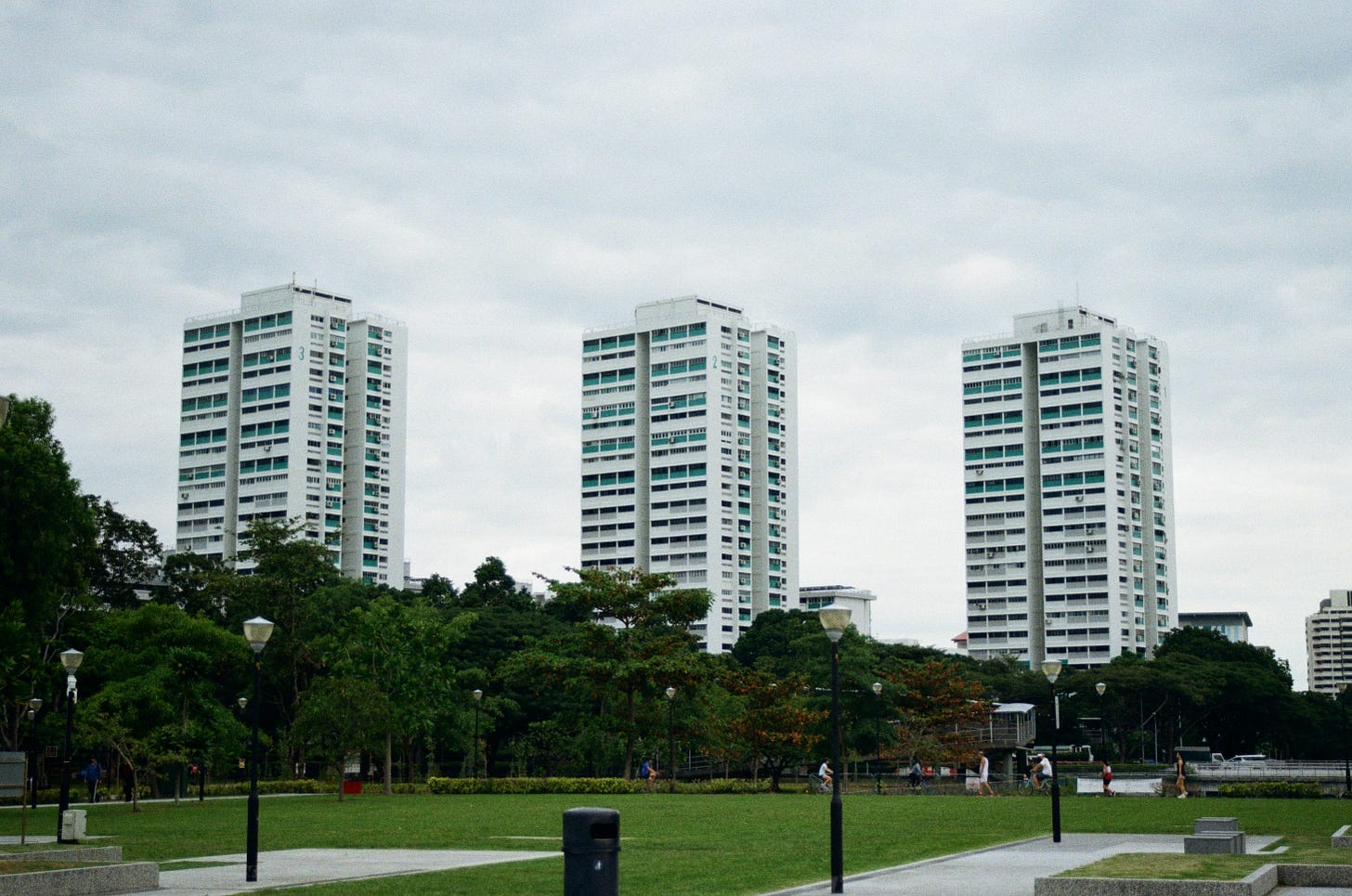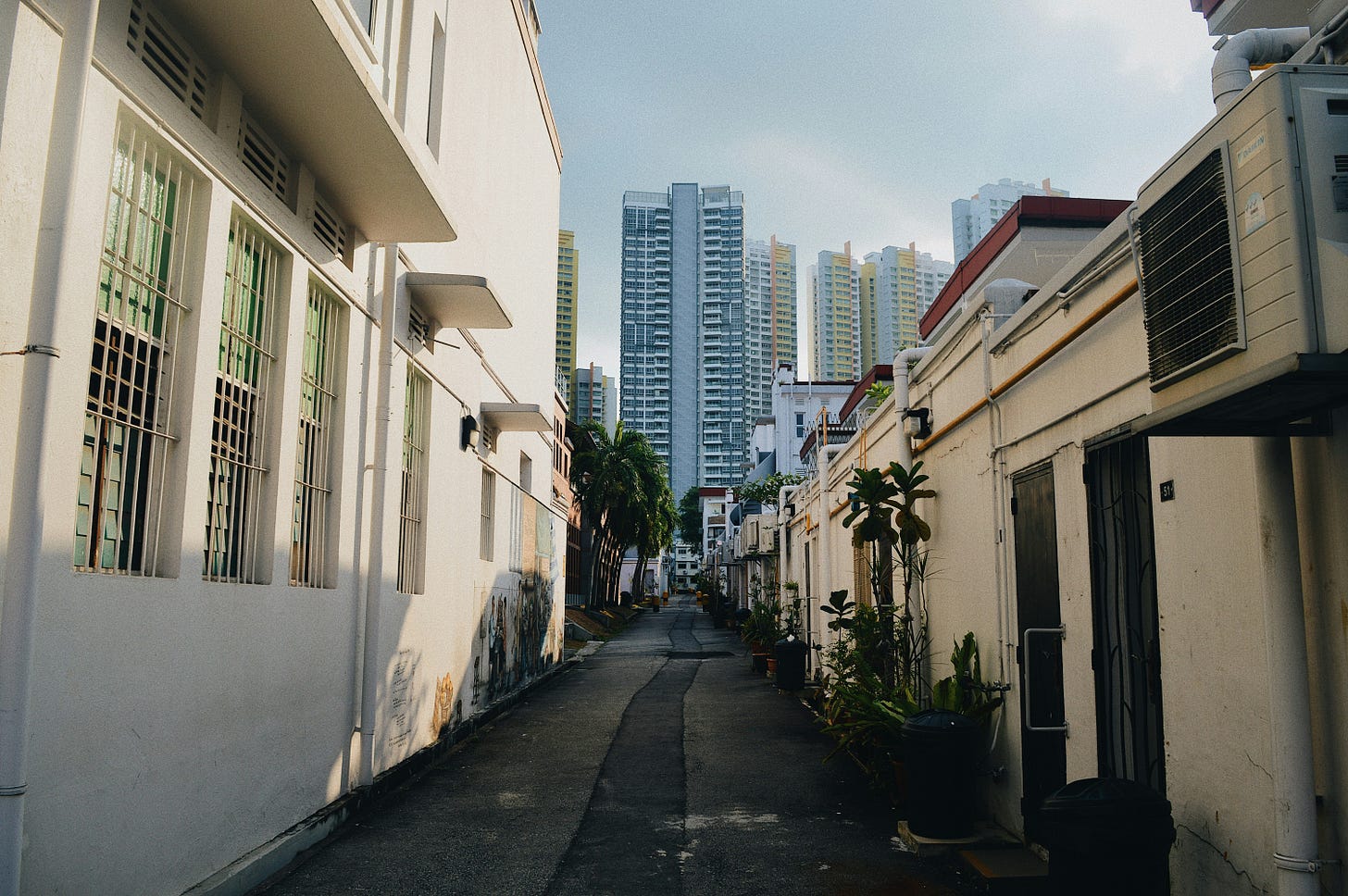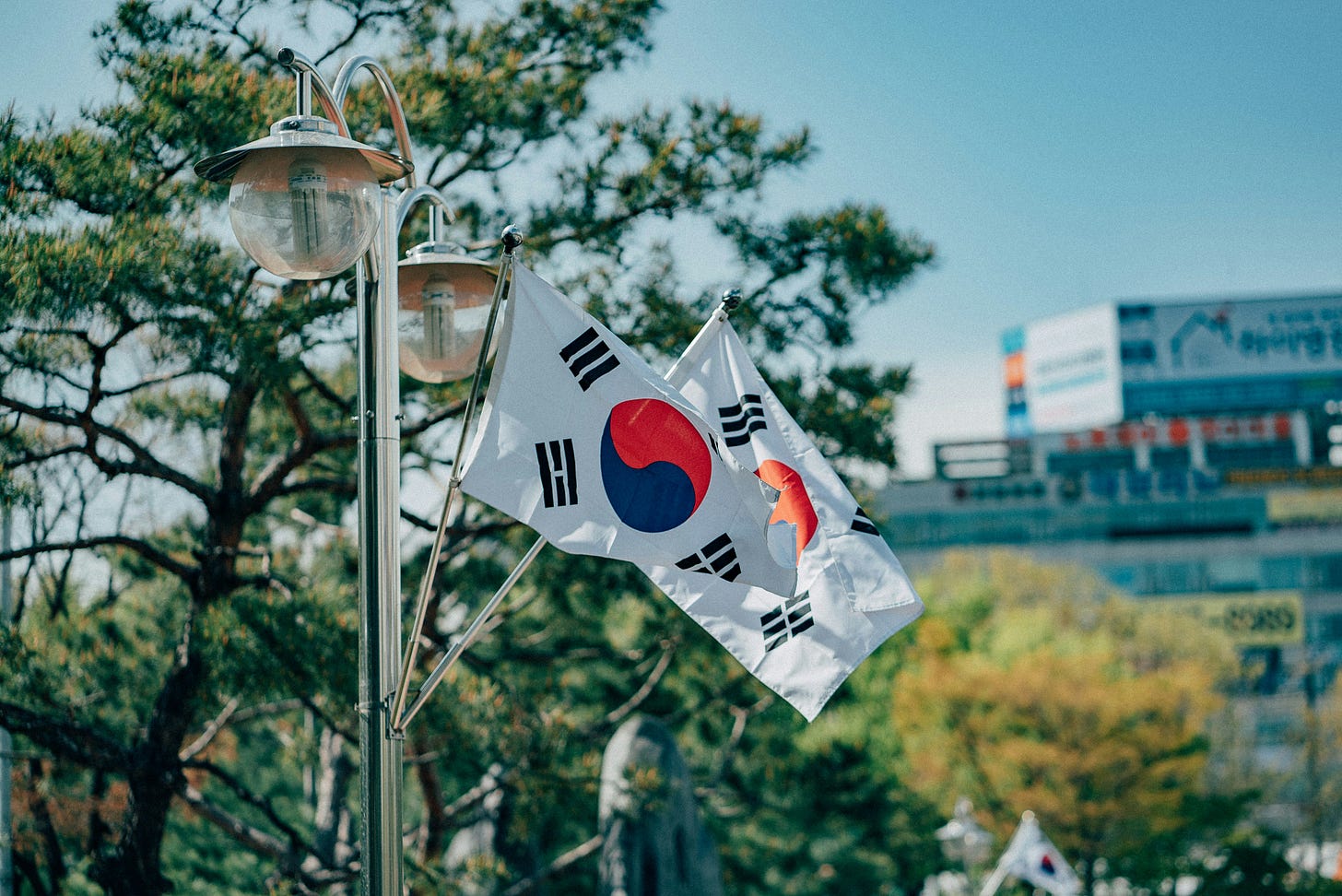Beyond bread and butter with a slice of immigration: Cohesion, cultivation, caregiving, and compassion (The Nine Days, GE2025)
A social service and social policy discursive wish-list for GE2025 – and beyond (Part Two) (March 2025)
(Disclaimer: Opinions expressed are solely my own and do not express the views or opinions of the Singapore-based social service and non-profit organisations with whom I work or consult.)
Last week, I wrote about the obvious prognostications – especially related to social service and social policy issues – for GE2025. Economically, inflation and the cost of living are likely top of mind. Experiences of poverty and inequality, or being part of the (perceived) “sandwich class,” will shape those inflation and cost of living concerns. And tied closely to economic concerns are immigration ones, alongside persistent expressions of xenophobia.
This week, I’d like to go beyond these expected issues to consider the social service and social policy topics I would like parties and candidates to discuss. They are broadly summarised as cohesion (of our communities), cultivation (of the young), caregiving (of the elderly), and compassion (for the disadvantaged). In doing so, I draw from recent commentaries and add particular questions of interest.
Because thus far, any meaningful contestation of ideas and policies has been overshadowed by the slow-drip of candidate-centred announcements. Questions posed to and features of these candidates largely portray them as milquetoast and likely to toe the party line. Yes, diversity and representation matter. Yes, growing up disadvantaged or marginalised allows for their lived experiences to inform policymaking. Yes, general interest in socio-economic and municipal issues is useful (perhaps expected). But, especially those representing the ruling People’s Action Party (PAP), I do not think it is too much to ask of potential parliamentarians – beyond what their parties offer – about their individual policy and legislative aspirations.
Cohesion (of our Communities)
The cohesion of our communities is linked to the government’s relationship to its people, especially given its outsized role across all aspects of our lives in Singapore. But how we relate to each other – as a population – matters too. This discussion was front-and-centre in January this year, at the annual Institute of Policy Studies conference. A key study finding that “the number of close friends that Singaporeans have has shrunk over the past six years, from 10.67 on average in 2018 to 6.49 in 2024” appears to suggest that our country’s social cohesion is strained. Additionally, Singaporeans appear to prefer interacting with others of similar income levels.
At the same conference, in his assessment of the health of community in Singapore, Hong Kong Baptist University’s Prof. Cherian George argued that “we don’t have the kind of horizontal, people-to-people trust that would allow community to flourish.” The solution is not for the PAP government to get out of the way or avoid “crowding out” diverse forms of civic engagement and political participation. Instead, cohesion is strengthened when the state is less autocratic and tolerates competition and contrarian perspectives in a more vibrant civil society. He concluded:
“If building community solidarity is the objective, the state does not need to retreat from its engagement with social issues. It just needs to radically rethink the terms of that engagement.”
Also at the conference, Nanyang Technological University’s Prof. Teo You Yenn focused on the responsibilities of companies and corporations. “Occasional activities” such as corporate social responsibility, days of service, and volunteerism or philanthropy are not enough. She posed a list of questions to businesses, for example, in relation to wages and labour, whether workers have a choice in decisions affecting their well-being, and how businesses weigh their potential societal contribution and harm. “Too often, corporations exert unfettered power over lives because too small a group of people within them have had too much say in the decisions that govern large numbers of people.”
Here are some questions I’ll be looking out for:
1. How do political parties and their candidates understand “the community?” And how do they perceive growing socio-political pluralism in Singapore?
2. What do they think about activism and advocacy as they relate to issues (e.g., Gaza and Palestine, the death penalty, climate change and action) as well as engagement and participation forms (e.g., community organising, social media campaigns, university-based action)?
3. Who are the Singaporeans least likely to be engaged civically and politically – including and especially across past national conversations – and how do we reach them and better represent their voices?
Cultivation (of the Young)
A personal paradox clouds my assessment of Singapore’s education system. The system stressed me, it made me irrationally competitive about everything, and the mere thought of the high-stakes examinations I took decades in the past – and the worry I felt when waiting for my results – still gives me anxiety today. However, somewhat strangely, the wretched system and its unrelenting rigour gave me the knowledge and skills to succeed academically and professionally.
Still, most agree that academic pressures to do well are unhealthily high, for a Singaporean’s competitive rat race often begins in school (or even pre-school these days). My experience of benefits is also by no means representative. In this vein, nothing epitomises the challenges associated with the cultivation of Singapore’s students more than the reliable growth of private tuition. Our collective household expenditure on private tuition stood at S$1.8 billion in 2023, compared to S$1.4 billion in 2018 and S$1.1 billion. There is also an equity problem: “The top 20 per cent of households by income spent on average S$162.60 a month on tuition – more than four times the S$36.30 spent by the bottom 20 per cent.”
Serious criticisms of our education system are not new, though parents – previously educated in these pressure-cooker environments themselves, now witnessing their children going through the system and experiencing their pain by proxy, and perhaps still trapped in a rat race where comparisons vis-à-vis their peers are rife – have been increasingly vocal. Many find it hard to shake the appeal of perceived academic prestige and the impetus to have their children attend “elite schools,” particularly over neighbourhood ones. Relatedly, familiar policy recommendations include smaller class sizes, reforming the PSLE or making it optional, improved professional support for learning and mental health needs, as well as a more equitable and inclusive admissions system.
Here are some questions I’ll be looking out for:
1. Everyone has critiques of Singapore’s education system, yet there are objective measures of its relative success (e.g., PISA, TIMSS, comparative progress among low-progress learners). Hence, as a starting point, what has worked or been effective so far, especially since most political candidates are likely to have, to a pretty large extent, benefited from the system?
2. Thereafter, what needs to change? Which policies need to move together? The Ministry of Education is not oblivious to the aforementioned challenges and has taken a stab at reform. Political parties and candidates cannot be oblivious and propose changes in a vaccum. As such, how has the ministry done? What should it do?
3. What do we do about private tuition, given its outsized financial footprint and assumed necessity among parents and students? It will be hard to put the genie back in the bottle, but surely we could do more besides an advertisement code of conduct for the industry?
Caregiving (of the Elderly)
Caregiving of Singapore’s elderly “works” to some extent, for now, because we have collectively accepted three related realities. First, that family members – often the unmarried, eldest daughter without children – will step in and up as the primary caregiver. Moreover, such familial obligation is expected, and the associated burdens go unquestioned. Second, that we will continue our collective reliance on low-wage migrant domestic workers (MDWs) from Singapore’s neighbouring countries, some of whom shoulder household chores and child-rearing duties on top of their caregiving responsibilities. And third, that with enough money, wealthier Singaporeans can pay for higher-quality formal care.
Public concern over caregiving gained traction immediately after this year’s Budget. A forum letter to “The Straits Times” advocated for caregivers to be valued and financially compensated: “Moving beyond traditional support measures to recognising caregiving as essential labour.” Cumulatively, caregivers’ labour is valued at S$1.28 billion annually. Underlying this advocacy was also a desire for caregiving to not remain an “individual responsibility,” because family members and MDWs “perform the lion’s share of care.” Other relevant policy recommendations include paid care leave as well as the raising of the current Home Caregiving Grant for non-working, full-time caregivers.
Here are some questions I’ll be looking out for:
1. What is the balance or relationship between one-off Budget giveaways and permanent financial and social assistance programmes? Tied to such a question, I believe, should involve a nation-wide conversation about what graceful and meaningful ageing look like.
2. Relatedly, what does a good life look like, for full-time informal caregivers in the family?
3. What might caregiving look like, if informal caregivers were better compensated and were better taken care of? What might caregiving look like, if and when some family members – previously obligated and even guilted – are physically exhausted and psychologically burnt out?
4. How might Singapore cope, if and when the supply of MDWs run dry?
Compassion (for the Disadvantaged)
Meritocracy remains central to Singapore’s narrative and expectations of its continued socio-economic success, that hard work and excellence – paired with the availability of diverse opportunities – should result in chances of success, “regardless of starting point or family background.” To the government’s credit, discussions of income inequality and social mobility are no longer taboo. Furthermore, recognising that some Singaporeans are disadvantaged by skewed starting points and growing up in less-privileged family backgrounds, it has offered more targeted support to lower-income families and their children.
Yet luck is an important determinant of success in one’s life in Singapore. For example, the socio-economic status to which one is born, or one’s academic aptitude in a Singaporean education system which still privileges grades and credentials, may influence whether one emerges as a meritocratic “winner” or “loser,” and thus solidifying one’s ossified station in life. Politically (as mentioned in the last newsletter), as objective markers of socio-economic progress, the ruling PAP will point to rising household incomes, lower income equality, and fewer households requiring financial assistance. However, the government has to tackle more subjective voter perspectives about fairness and deservedness, feelings of being left out or left behind, and perceived obligations – or lack thereof – to those who are disadvantaged or marginalised.
Consequently, Singaporeans who see themselves as having “earned” their success, meritocratically, may hold less compassion for those who may not have done as well, when they are seen as not having worked hard enough.
Finally, compassion must also extend to our regional neighbours. The Trump administration’s scaling back of foreign aid – especially by gutting USAID (US Agency for International Development) – has not significantly affected Singapore, but it has been deleterious for South East Asia. A February survey by the philanthropy platform Asia Philanthropy Circle estimated hundreds of millions of lost funding dollars as well as millions affected by programme closures, service cutbacks, and staff educations. Malaysian non-profit organisations and social service programmes have been downsized or shut down, and US humanitarian support in the aftermath of the Myanmar earthquake has been compromised.
Here are some questions I’ll be looking out for:
1. How will parties approach the centrality of meritocracy in Singapore, vis-à-vis ongoing discourse around income inequality and social mobility? How do candidates individually understand meritocracy and their personal relationship to it?
2. What are the structural and systemic discussions surrounding disadvantaged and marginalised Singaporeans?
3. Amidst ostensibly meritocratic competition, what obligations do we have to each other as Singaporeans?
4. Given broader geopolitical trends, especially the US’s reduced footprint in the region, what is Singapore’s role? Should it have one?
Global news roundup
In South Korea, politically, impeached president Yoon Suk Yeol was released after a ruling that he was detained illegally, but he still faces insurrection and other charges. Then, the impeachment of a former prime minister was overturned by a court, thereby reinstating him as acting president.
The Truth and Reconciliation Commission found that adoption agencies committed widespread malpractices decades ago, when children were sent to American and European homes. The report was the government’s first official admission of problems related to rights violations of South Korean adoptees. Separately, at least 15 people were wounded after two of its fighter jets accidentally dropped bombs on a civilian area during a live-fire exercise. And multiple wildfires, the worst in the country’s history, killed at least 24 people.
In Syria, the new government has been struggling to restore control, following clashes between state military forces and gunmen loyal to the ousted president Bashar al-Assad. The majority of victims also appear to be civilians targeted in revenge killings. With thousands dead and curfews imposed, it is the worst violence since Mr. Assad’s ousting in December 2024. Later, the Kurdish-led militia which controls part of the country agreed to merge with the new government, a breakthrough which signifies a major step towards unification.
And in Turkey, authorities detained the president's main political rival on charges of corruption and aiding a terrorist group, capping a months-long legal crackdown on opposition figures. It has resulted in the country’s largest protests in over a decade.
Also read about the following in this month’s roundup:
Elections in the horizon and the present;
Diplomatic and geopolitical conflicts; as well as
Political consequences and repercussions.





Thanks Jin Yao for your always insightful thought provoking sharing